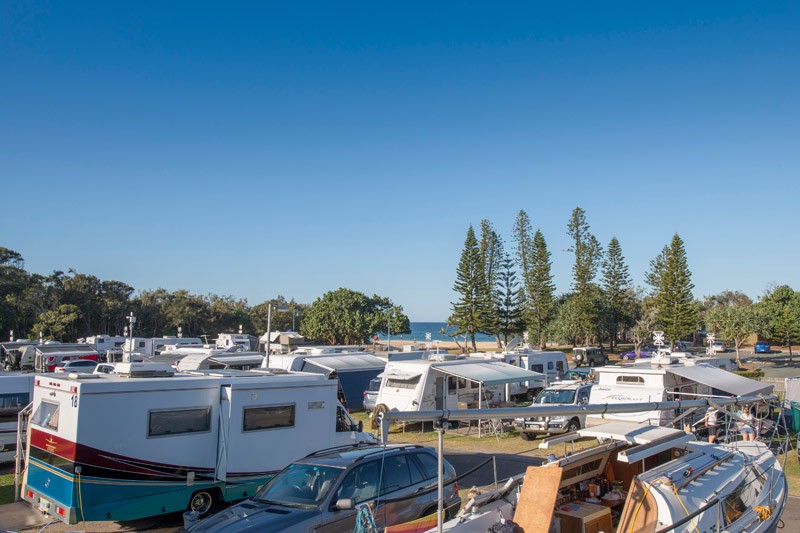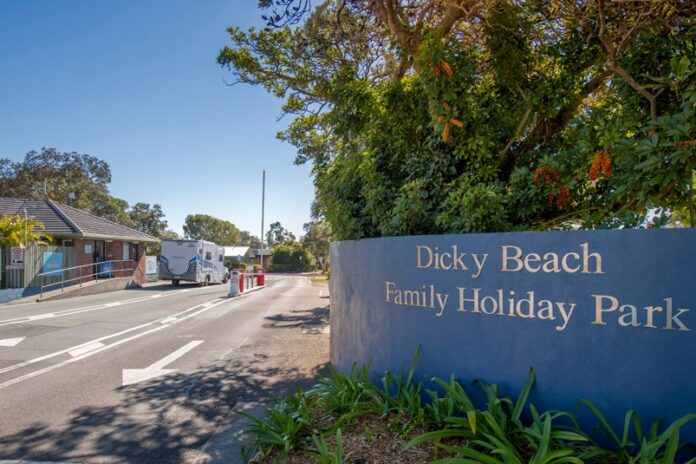Sunshine Coast Council may gradually phase out long-term residents at a local holiday park by adopting a “natural attrition” approach to tenancy agreements.
Currently long-term tenants at Dicky Beach Holiday Park can remain onsite for as long as they are willing or able, or can sell their dwellings with the right to remain onsite, meaning new long-term tenants can move in.
But Sunshine Coast Council could amend the policy so if a long-term tenant no longer resides onsite, the site is returned to the holiday park for use as a tourist site.
Earlier this week the agenda for tomorrow’s meeting of the council included an officer’s report and recommendation to adopt the policy at Dicky Beach. But the agenda has since been updated, saying: “This item was withdrawn by the chief executive officer.”
The officer’s report said the potential change would bring Dicky Beach into line with the five other council-managed holiday facilities on the Coast, which have had the natural attrition policy since 2005.
“The Sunshine Coast Holiday Parks network includes six sites across the region, all located at pristine seaside locations,” it said.
“Within the six holiday parks, 121 sites are occupied by 191 long-term tenants. Of these 121 sites, 82 are positioned at the Dicky Beach Holiday Park.
“The arrangements at Dicky Beach Holiday Park differ from other parks in the network, whereby long-term tenants are permitted to sell their non-fixed dwellings with the right to remain onsite, enabling new tenants to take up residential occupancy.
“This practice reflects legacy policy settings and previous council decisions.
“Over time this approach will reduce the number of tenants in the holiday park and return sites to the tourist pool.”
Do you have an opinion to share? Submit a Letter to the Editor at Sunshine Coast News via news@sunshinecoastnews.com.au. You must include your name and suburb.
The holiday parks operate on state government land under a trustee arrangement with the council.
“The stated purpose of the land, as per the state government’s direction and in accordance with the Land Act 1994, is for these reserves to be used for recreational and holiday camping. Long-term occupation by tenants is contrary to the dedicated purpose of the reserve,” the report stated.
The report also detailed the potential financial benefits of adopting the policy.
“The holiday parks provide a positive income return to council, complementing rates and other sources of revenue,” it said.
“The current revenue generated from the 82 residential sites at the Dicky Beach Holiday Park is $871,542. The current corresponding average income for 82 tourist sites at Dicky Beach Holiday Park is $1,703,593.”

The report notes that potential risks to the council include tenants objecting to the inability to ‘on sell’ to new owners, a loss of income as sites are vacated and negative perceptions from residents.
A human rights assessment was also conducted by the council, which concluded the proposed approach to long-term tenants at Dicky Beach was reasonable.
Related story: Campers set to benefit from $2.28m holiday park upgrades
The report stated the council considered other options at Dicky Beach, including setting a fixed date to return all sites to tourism use, raising rent to fund park improvements, or continuing current arrangements.
The policy, if adopted by the council, would be introduced in tenancy agreements from May 2026. The report said preference was given to providing six months’ notice to tenants before existing agreements come to an end, but only 60 days was legally required.
The officer recommended that the council endorse the application of the natural attrition procedure for residential sites across all Sunshine Coast Holiday Parks.
After the item was removed from the agenda, it is now unclear how the council will proceed with the issue.





